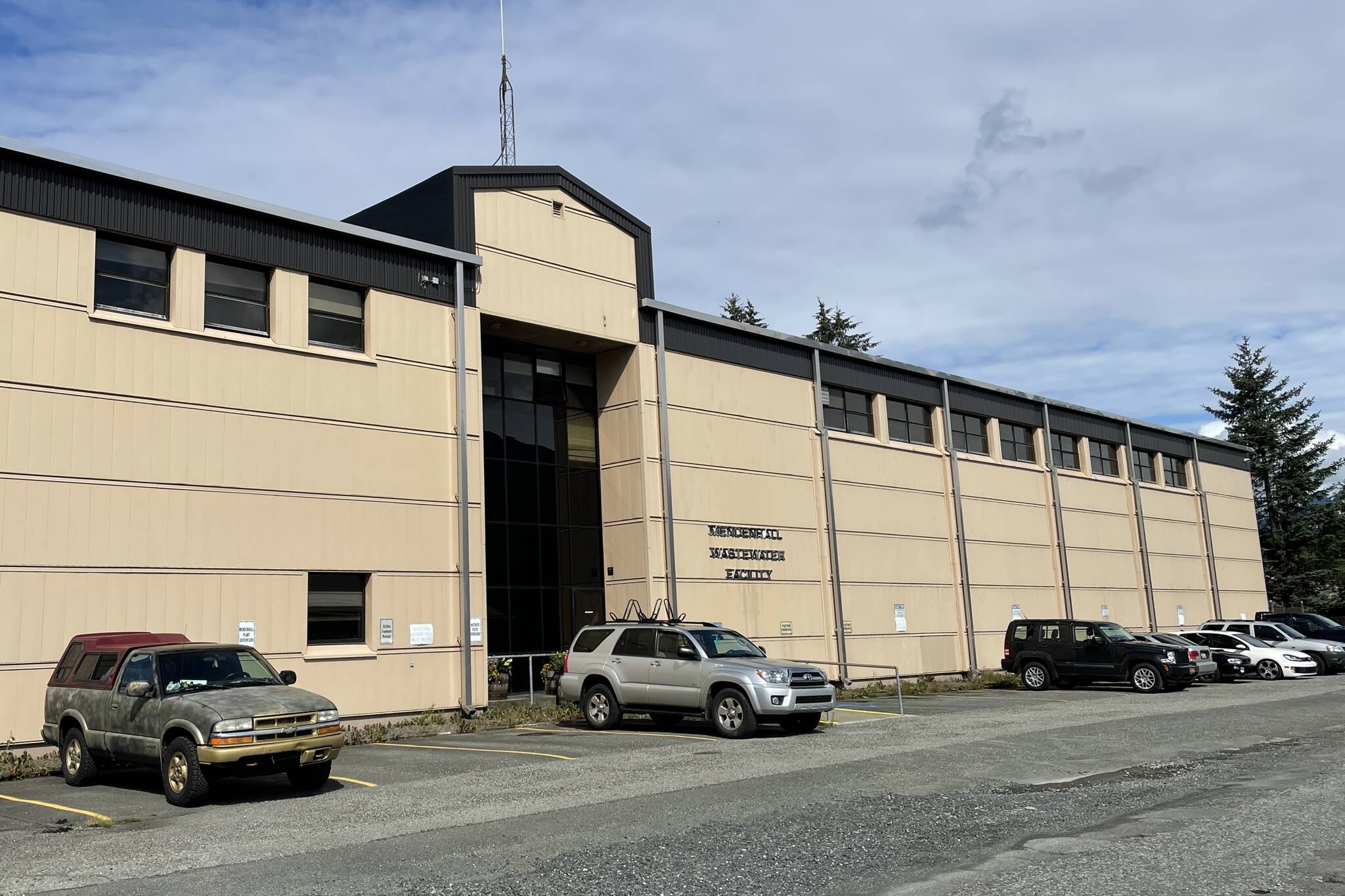Climate change is now being blamed as a contributing factor in violations at the Mendenhall Wastewater Treatment Plant due to increasing rain resulting in an overflow from storm and roof drains, thus disrupting the ecology of the plant’s biological treatment.
The finding was presented last Thursday as part of a webinar discussing a report published Monday about climate change impacts in Juneau. Katie Koester, the city’s engineering and public works director, said the 50-year-old wastewater plant’s microorganisms can’t properly treat the volume and contents of water during abnormally high intake periods.
“In 2020 we had this massive spike in rainfall that entered into our system,” she said. “What happens then is the bugs get overwhelmed and we can’t do our job.
“We have violations because of that.”
The Mendenhall wastewater facility has normally handled roughly 250,000 to 300,000 gallons of intake a day since 2016, with a few single-instance spikes between about 500,000 and 650,000 gallons. But that average has increased somewhat since 2019 and spiked to a record high of nearly 1 million gallons on Dec. 1, 2020, due to a record amount of rainfall during a 24-hour period, according to a report published Monday assessing climate change impacts on Juneau.
The city agreed in 2021 to pay a fine $64,000 and implement corrective actions for violations at two of its three wastewater treatment facilities between 2015 and 2019. The compliance order with the Alaska Department of Environmental Conservation, which issues permits to protect water quality, generally involved discharges of treated water that was out of compliance with state-issued permits due to “exceedances” at the Juneau-Douglas and Mendenhall Valley wastewater treatment plants.
Improper disposal into drains by residents and businesses of “high-strength waste” substances such as food grease and motor oil was cited as the primary factor disrupting the Mendenhall Valley wastewater treatment process, with discharges from cruise ship wastewater systems also cited for issues at the Juneau-Douglas plant.
Denise Koch, the city’s deputy director of engineering and public works, emphasized in a written response to an inquiry during the webinar the city “didn’t receive any violations from DEC because of cruise ships last year.”
“CBJ has contracts with individual lines and monitors the characteristics of the waste,” she wrote. “As Katie mentioned, our main problems are with high-strength waste going into the Mendenhall WWTP, which cruise ships don’t impact at all. That high-strength waste is generated by the community.”
Koester said an agreement reached with cruise ship operators ensures “we will never accept (that) waste if we think it will damage our bugs and damage our system.”
Climate change was not cited as a significant factor when the agreement addressing the earlier violations was announced. But the 53-page study published Monday, in a half-page section detailing the problem, states “high precipitation events like the storms of October 2019 and December 2020 have overwhelmed Juneau’s infrastructure.
“Both of these events represent 100-year storms, while Juneau’s storm drain system is designed to handle a 20-year event,” the report states.
The December 2020 storm resulted in the most rain ever recorded in a 24-period at Juneau International Airport at just shy of five inches, according to the climate report. It also triggered numerous small landslides that caused $4.7 million in damage to homes, roads and other infrastructure.
“The Mendenhall Wastewater Treatment Plant experienced a dramatic influx of effluent, partially as a result of residential and business roof drains being illegally connected to the sewer system,” the report states. “Large volumes of fresh water going into the wastewater influent disrupt the ecology of biological treatment and require additional resources to be moved through the system to help it recover.”
The climate report also details remedial actions already taken, in progress and worth future consideration. Such actions with the wastewater plants have been occurring in recent years including efforts to increase public awareness of high-strength waste, and trying to identify and eliminate sources of rainfall infiltration and inflow where possible.
“The impact of excess ‘clean’ stormwater going into our system is that it reduces the amount of treatment time available to treat the wastewater because of the hydraulic constraints of the plant,” Lori Sowa, city projects engineer, stated in a written comment during the webinar. “All systems have some level of I&I, but what we see during atmospheric river events is extreme.”
Upgrading storm drainage is also being evaluated, although some of the improvements needed may be extensive, the climate report notes.
“Many of the issues with drainage from the December 2020 storm involved debris clogging drains, which larger culverts would not necessarily have fixed,” the report states. “Additional engineering and analyses need to go into any recommendations for mitigating the effects of increasing precipitation in the borough.”
• Contact reporter Mark Sabbatini can be reached at mark.sabbatini@juneauempire.com.

